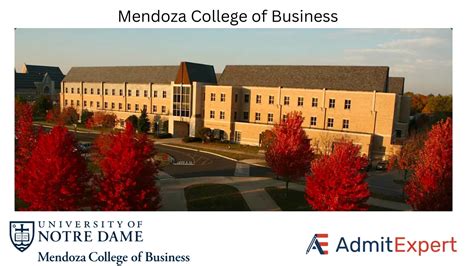Navigating the Financial Implications of a Notre Dame MBA

Pursuing an MBA from the renowned University of Notre Dame is an investment in your future. Understanding the associated costs is crucial for making informed decisions about your education. This article provides a comprehensive breakdown of the tuition, fees, and other expenses related to the Notre Dame MBA program.
Tuition and Fees
The Notre Dame MBA program offers two distinct tracks: the Two-Year MBA and the One-Year MBA.
| Program | Tuition | Fees |
|---|---|---|
| Two-Year MBA | $118,560 | $6,500 |
| One-Year MBA | $136,760 | $6,500 |
Additional Expenses
Beyond tuition and fees, there are several other expenses to consider when budgeting for your Notre Dame MBA. These include:
- Books and Course Materials: Estimated at $5,000-$10,000 for the entire program.
- Housing: Average rent in South Bend, Indiana (where the university is located) ranges from $900-$1,300 per month.
- Transportation: Assuming a monthly public transportation pass or car expenses, budget approximately $500-$1,000 per month.
- Health Insurance: The university offers health insurance plans for students, typically costing around $1,000-$3,000 per year.
- Personal Expenses: This includes costs for food, entertainment, and other personal items. Estimate around $1,000-$2,000 per month.
Total Cost of Attendance
Combining these expenses, the total cost of attendance for the Notre Dame MBA program can be estimated as follows:
| Program | Total Cost (Two Years) | Total Cost (One Year) |
|---|---|---|
| Two-Year MBA | $270,000-$320,000 | N/A |
| One-Year MBA | N/A | $150,000-$160,000 |
Financing Options
Notre Dame offers several financing options to assist students in covering the cost of their MBA education. These include:
- Loans: The university partners with several lenders to offer student loans with competitive interest rates.
- Scholarships: The Mendoza College of Business offers merit-based scholarships to incoming MBA students.
- Graduate Assistantships: Some students may qualify for graduate assistantships that provide financial assistance in exchange for work on campus.
- Employer Sponsorship: In some cases, students may be able to negotiate with their employers for financial support or tuition reimbursement.
Return on Investment
When considering the cost of an MBA, it is important to evaluate the potential return on investment. The Notre Dame MBA has a strong track record of graduates earning high salaries and advancing their careers. According to the most recent Graduate Management Admission Council (GMAC) survey:
- The median starting salary for Two-Year MBA graduates is $125,000.
- The median starting salary for One-Year MBA graduates is $130,000.
- 95% of Notre Dame MBA graduates are employed within three months of graduation.
Strategies for Reducing Costs
There are several strategies students can employ to reduce the financial burden of their MBA education:
- Negotiate Scholarship Funding: Reach out to the admissions office and inquire about scholarship opportunities.
- Apply for Grants and Fellowships: Research external funding sources and apply for grants or fellowships that may support your MBA expenses.
- Work Part-Time: Consider working part-time during the program to supplement your income.
- Consider a One-Year MBA Program: If your career goals align with a shorter, more intensive program, the One-Year MBA can save you significant costs.
- Maximize Employer Sponsorship: Explore options for tuition reimbursement or financial support from your current or future employer.
Conclusion
Earning an MBA from Notre Dame is a significant investment that requires careful financial planning. By understanding the associated costs, exploring financing options, and considering cost-saving strategies, you can make an informed decision about pursuing this prestigious degree. With its exceptional reputation, high earning potential, and strong return on investment, the Notre Dame MBA remains a wise choice for ambitious professionals looking to advance their careers.
Frequently Asked Questions
- What is the average GMAT score for Notre Dame MBA applicants? The average GMAT score for Notre Dame MBA applicants is 660.
- What is the acceptance rate for the Notre Dame MBA program? The acceptance rate for the Notre Dame MBA program is approximately 30%.
- What is the average work experience of Notre Dame MBA students? The average work experience of Notre Dame MBA students is 5 years.
- What are the career outcomes of Notre Dame MBA graduates? Notre Dame MBA graduates pursue a wide range of careers in industries such as consulting, finance, technology, and healthcare.
- Is financial aid available for Notre Dame MBA students? Yes, Notre Dame offers a variety of financial aid options including scholarships, grants, and loans.
- What is the difference between the Two-Year and One-Year MBA programs? The Two-Year MBA is a traditional, two-year program that provides a more comprehensive educational experience. The One-Year MBA is a shorter, more intensive program designed for experienced professionals looking to accelerate their careers.
- Is the Notre Dame MBA worth the cost? The Notre Dame MBA has a strong track record of graduates earning high salaries and advancing their careers, providing a solid return on investment.
- What are the best ways to reduce the cost of an Notre Dame MBA? The best ways to reduce the cost of an Notre Dame MBA include negotiating scholarship funding, applying for grants and fellowships, working part-time, considering a One-Year MBA program, and maximizing employer sponsorship.
